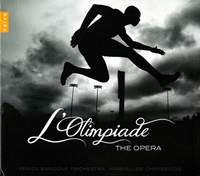Recording of the Week,
L’Olimpiade: The Opera
Even the relatively un-sporty atmosphere in the Presto editorial office has been shaken up by the forthcoming London 2012 Games – not being ‘shaped for sportive tricks’, however, I think this newly-constructed Olimpiade is likely to be the closest I get to Olympic Fever! No newly-discovered manuscript, this, but instead a fascinating compendium of various composers’ responses to a single libretto by the great eighteenth-century poet Metastasio.

Astonishingly, over fifty composers set Metastasio’s libretto to music. While many of these settings have long since disappeared or continue to languish in various European libraries, this project has brought together selected arias from sixteen composers, including Antonio Caldara (who collaborated with Metastasio for the original setting in 1733, when the project was commissioned to mark the wedding of Emperor Charles VI) and Baldassare Galuppi who, according to the booklet-note, was well into the composition process before he realised that literally dozens of composers had pipped him to the post! Almost all the arias are world-premiere recordings: only Vivaldi’s contribution, I think, has been committed to disc before, by both Magdalena Kozena and Philippe Jaroussky.
The concept of the pasticcio seems a slightly odd one today, but to eighteenth-century audiences it was standard fare. Star singers were wont to roll up to a production with ‘suitcase-arias’ which they’d sung to great acclaim elsewhere, but because one libretto was often set by multiple composers this was only rarely problematic. (The ‘moveable feast’ idea was also helped by the fact that the conventions of the genre also meant that stock emotional states tended to be depicted through a fairly limited bank of metaphors: it’s possible to slot an aria about a ship caught in a tempest into pretty much any baroque opera you care to name!)
The (appropriately, Greek!) musical director Markellos Chryssicos has selected arias from right across the libretto’s fifty-year period in the limelight, ranging from Caldara’s original (just one number crops up – Aristea’s Grandi, e ver) to Paisiello’s Tu di saper procuro, dating from 1786. The finished article is a pleasing hotchpotch of high baroque, Rococo and early-Classical styles, and whilst the arias aren’t arranged chronologically I didn’t feel that any of the stylistic transitions were jarring. I have to say that that complete absence of connecting recitative did jar for me ever so slightly (we don’t get to hear most of the key narrative revelations themselves, but instead cut straight to the characters’ reactions), but I’m sure many others will regard this as a distinct positive!
Most of the arias made me want to investigate the complete settings further, and it’s good to make the acquaintance of some relatively obscure figures (Davide Perez, anyone?), but for me the laurels go to Hasse, whose contributions include Megacle’s bravura opening number and Siam nave oligente (the obligatory ‘storm-tossed ship’ moment) with a gloriously manic bassoon obbligato!
Romina Basso’s robust, flexible mezzo is made for this repertoire (along with two of her colleagues here, she’s already recorded Galuppi’s setting in its entirety, though in a different role), and tonally she’s a great foil for Franziska Gottwald as her friend/rival Licida – I’d not come across this singer before, but her pleasantly brittle timbre reminded me of the young Magdalena Kozena. Nicholas Phan, another relative newcomer, sounds incredibly youthful as the doddery old king but his distinctive, never-less-than-beautiful sound left me craving a full-length disc of arias. Fingers crossed for that, and for complete recordings of the finest settings – starting, ideally, with the Hasse.
There are sound samples and a short video on the website (although the latter has to come with a health warning as the sound quality and balance on the video in no way represents the quality of the recording, which is excellent throughout!).
Romina Basso (Megacle), Franziska Gottwald (Licida), Karina Gauvin (Argene), Nicholas Phan (Clistene), Ruth Rosique (Aristea), Nicholas Spanos (Aminta), Venice Baroque Orchestra, Markellos Chryssicos
Available Formats: MP3, FLAC



